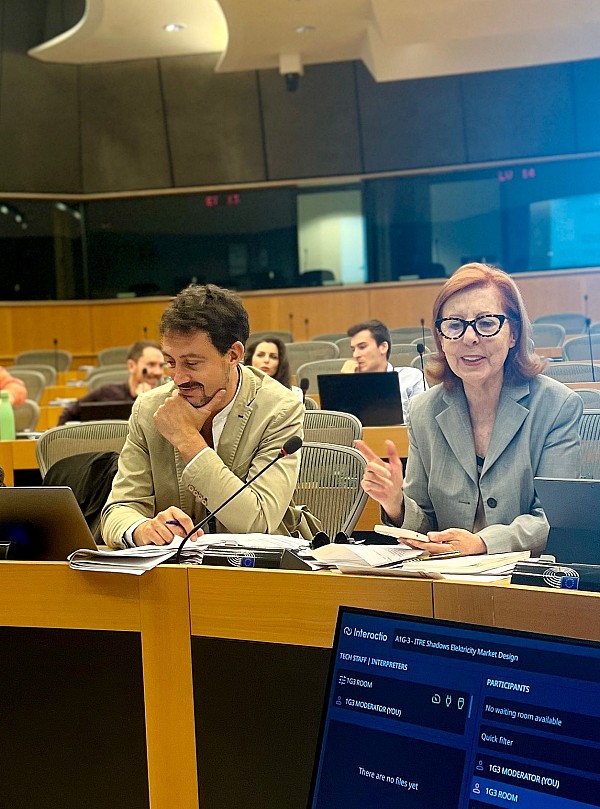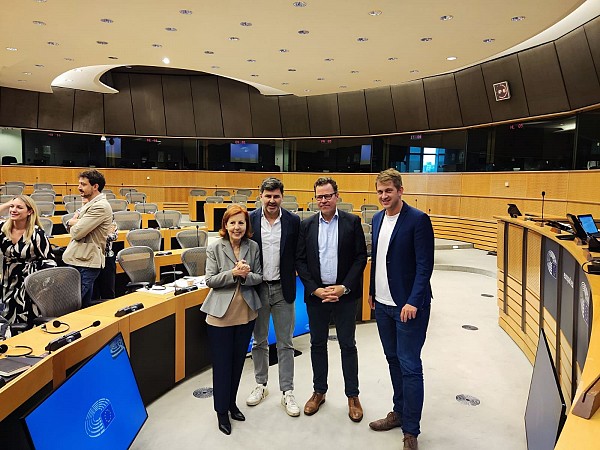Imprensa EU Parliament clinches political deal on electricity market reform
Political groups in the European Parliament have agreed on the broad terms of the EU’s electricity market reform on Thursday (6 July), paving the way for a swift adoption of the proposal in the EU assembly before decisive talks with EU member states to finalise the law.
The electricity market reform, tabled by the European Commision in March, seeks to avoid a repeat of last year’s energy crisis, which saw consumers faced with soaring energy bills due to record-high gas prices.
It is now being examined by EU member states and the European Parliament, which both need to agree on a common text before it becomes law.
While EU countries have so far failed to reach a joint position, the European Parliament is steaming ahead, with the main political groups now seeing eye-to-eye on the proposal.
“We have a deal. Broad agreement on Electricity Market Reform with the S&D, Renew, Greens and EPP,” said Nicolas Casares, a Spanish EU lawmaker leading the negotiations on behalf of the Socialists and Democrats (S&D).
Casares, who is the Parliament’s speaker on the proposal, pushed for banning the disconnection of vulnerable consumers and agreed with the centre-right EPP group to wind down emergency measures introduced during the crisis last year.
The Parliament’s industry committee is now expected to confirm this position in a vote scheduled for 19 July. The whole Parliament will then vote on the reform in September, paving the way for final negotiations with EU countries to take place in the autumn.
Revenue cap to be scrapped
In their joint position, the Parliament’s main political groups are pushing for barriers to protect the electricity market from emergency measures like revenue caps on electricity suppliers, which were implemented in Spain during the crisis.
Instead, lawmakers have agreed to aim for the abolishment of revenue caps, with the centre-right European People’s Party (EPP) taking credit for the move.
“The cap on revenues from inframarginal technologies was an absolute red line for the EPP,” said EPP negotiator and Portuguese lawmaker Maria da Graça Carvalho. “Thankfully, our position prevailed,” she said.
The electricity industry welcomed the change. “It is positive that the deal does not seem to include a price cap. These price caps have proved toxic to investments in renewables,” said Cillian O’Donoghue, policy director at Eurelectric, the European electricity industry association.
WindEurope, a trade association, is also against revenue caps, saying “they are toxic for investment
certainty” and “have proven to be a policy failure” in Europe where they inhibited investments in new wind farms.
“The introduction of revenue caps has led to a collapse in wind energy financing” with only €17bn invested in new wind capacity last year, “the lowest since 2009”, WindEurope told EURACTIV. “They must not be enshrined permanently in legislation,” it insists.
The Center for European Policy Studies, a think-tank, similarly warned of the downsides of maintaining the revenue cap. “Member states’ short-sightedness is the equivalent of sawing off the branch we all are sitting on,” it warned in a briefing paper earlier this week.
Parliament negotiators, meanwhile, sought to keep options open for state subsidies to the power sector – unlike the European Commission, which proposed limiting electricity subsidies to a single tool: contracts for difference (CfDs).
These contracts establish a price floor, guaranteeing minimum revenues for electricity producers, and a price ceiling, with potential surplus revenues going into government coffers for eventual redestribution to consumers.
Germany’s renewables lobby BEE called the proposal a “cage” and urged Berlin to scrap it.
WindEurope is more nuanced on CfDs, saying “they are a good mechanism to support the build-out of renewables” because they keep costs low and “guarantee revenue stabilisation and visibility” for investors.
However, it says CfDs “mustn’t be retroactively forced onto existing projects,” warning this would undermine investment security. Rather, “there must be sufficient flexibility to sell electricity under a Power Purchase Agreement (PPA) or on a merchant basis where operators wish to do so,” it adds.
Similarly, EU Parliament negotiators feared that the uneven implementation of CfDs could result in a fragmentation of the European electricity market – resulting in five paragraphs of guardrails for the scheme in the Parliament’s compromise text.
All eyes on EU countries
Michael Bloss, the Parliament’s negotiator for the Greens, took a shot at EU countries for failing to take a stance in the Council of the European Union, where ministers failed to reach a common position last month.
“We have achieved a breakthrough on the EU electricity market reform in Parliament today, while the Council is still sitting on its hands,” he quipped.
With Spain taking over the EU’s rotating presidency for the next six months, the pressure is now on Madrid to find a compromise among the EU’s 27 member states.
A deal on the proposal will be attempted “at the earliest possible date” an EU diplomat said, suggesting this could be achieved before the Spanish elections on 23 July.
Link: https://www.euractiv.com/section/electricity/news/eu-parliament-clinches-political-deal-on-electricity-market-reform/


